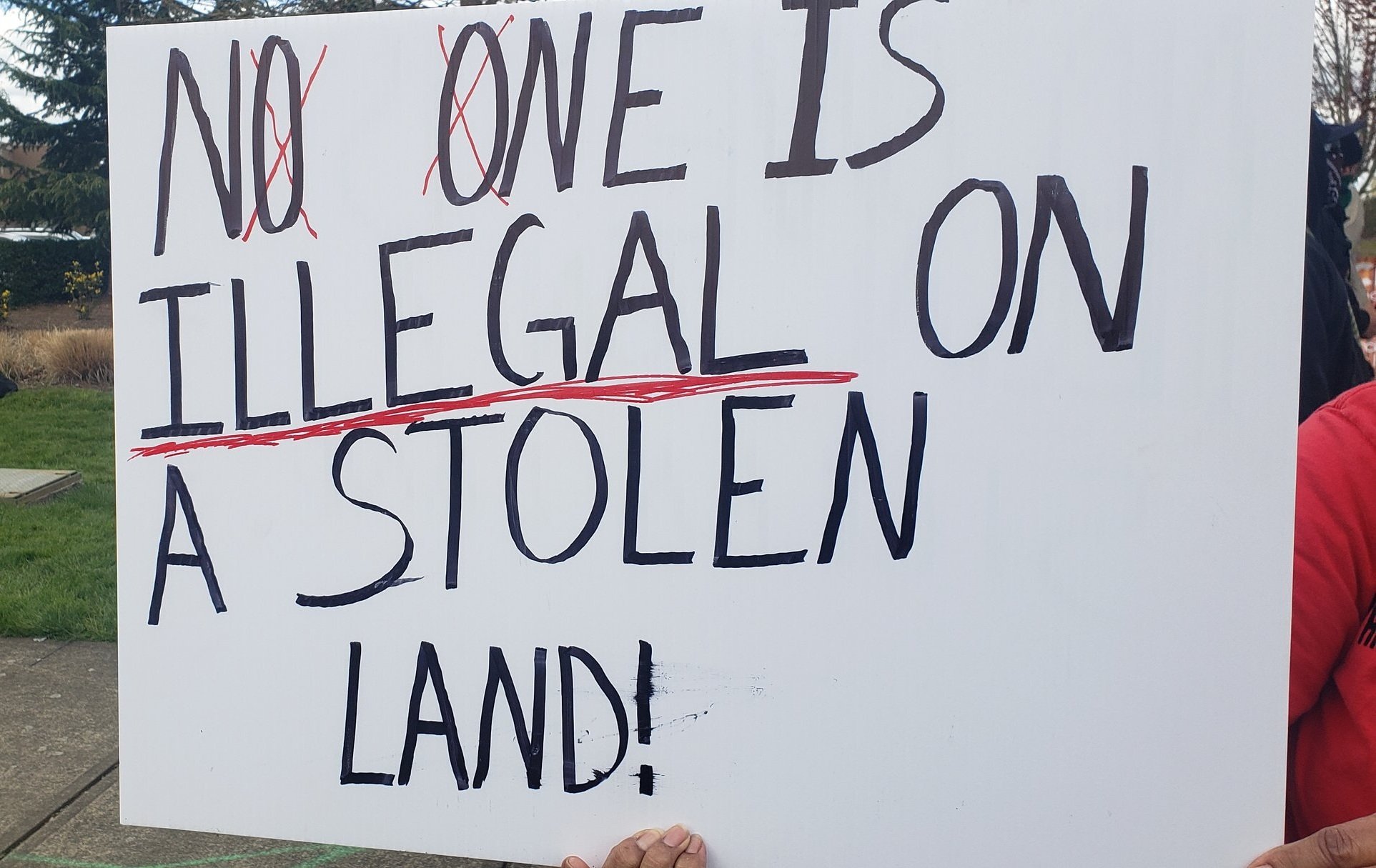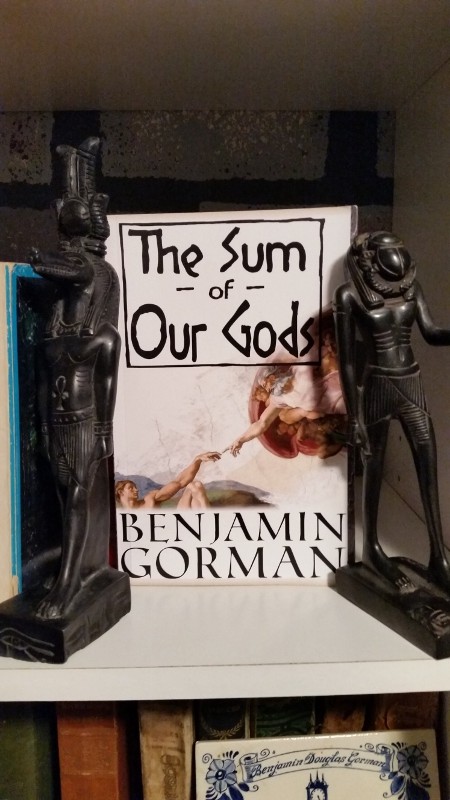Open Letter to Christians
/Um, excuse me, Christians? We need to have a talk. Please hear me out, and when I'm done, if this offends you, you can just ignore me. I get the impression you've become pretty practiced at ignoring.
If it helps, I used to be one of you. I was raised in a loving Christian household. I was baptized, confirmed, and married in the Church. At one point in my life, I even thought I’d become a pastor. Many of the people I love and respect most are Christians. Like some of you, I went from being a Christian to a Christian-But-Not-That-Kind-Of-Christian to “I’m uncomfortable with the label but I love Jesus,” to … well, not a Christian at all. If that last part means you don’t want to hear what I have to say, I understand. At one point in my life, I would have been reluctant to hear criticisms of Christianity from non-Christians, too. But here’s the thing: The Body of Christ has cancer. You may not want to hear that diagnosis from someone who doesn’t share your faith, but ignoring cancer does not make it go away. And if you’ve read this far, you are the kind of Christian who would do more than just pray for the cancer to go into remission. You’d talk to someone about chemotherapy or radiation or surgery. And the person you’d talk to might not even be a Christian. So consider hearing me out.
The prognosis is bad. It’s really bad.
First, the symptoms:
Today I attended a counter-demonstration, a protest of a rally. The rally was part of the Reawaken America Tour, a cash-grab featuring disgraced army general and felon Michael Flynn, and Eric Trump Jr., a man who is mostly famous for being the worst son of our worst President and whose only noteworthy personal accomplishment was stealing millions of dollars from a supposed cancer charity to give to his own family. One of the themes of these crooks’ rally, according to the group’s own materials, was a celebration of the forced conversion of Native Americans to Christianity. The organizers of the rally called it "The Trail of Joy Tour" to maximize offensiveness. You read that correctly; they had a rally to celebrate a genocide. They held it in a stadium (specifically the Volcanoes baseball stadium in Keiser, Oregon), and they hired the Proud Boys to provide "security." Yep. They hired members of an identified hate group to protect them from peaceful protesters so they could hold a hate rally.
Now, you and I both understand the people inside don't give two shits about Native Americans. That was never really the point. In the same way they like to target trans people, they've picked a group who are (now, thanks to the very genocide they are celebrating) too small in number and have too little political power to fight back. They didn't care what an Indigenous person thought of their rally. That wasn't the point. They picked the most offensive idea they could get away with in order to get attention. I'm sure, if they thought they could get away with it, they would have been celebrating the forced conversion of enslaved Africans, or maybe holding a somber memorial for the glory days before women could vote. They might as well have called it The Trigger The Libs Hate Rally. That's really the point. I was torn about attending the protest against their rally because I know I'm giving them some of the attention they crave. I'm feeding the trolls. But I was asked to go by a member of a local tribe and an activist in the Land Back Movement. I've been taught that if a colonizer like me participates in land recognitions but doesn't actively support the Land Back Movement, that's the height of hypocrisy. I've led land recognitions before. So I couldn't say no when I was asked to step up and do something about it.
I freely admit I was nervous. Underneath my t-shirt that says, “Fight Fascism with your voice while you still can,” I put on my bullet proof vest. I don’t know which is more laughably absurd, a public school teacher in a bullet proof vest or a guy who writes books of poetry wearing a bullet proof vest, but I was both today.
Luckily, our protest of the rally remained peaceful. To my relief, the Proud Boys handling security stayed inside the stadium, and we stayed outside. I heard a rumor that there was a bit of a falling out between the rally’s organizers and the Proud Boys, so many of the Proud Boys went to their own event in Clackamas, Oregon, leaving just enough to satisfy the obligations of the contracts the rally’s organizers made with them. I cannot confirm this, and we were nervous about what might happen if we waited until the end of the rally. The lead organizer of our protest, an elder from the Kalapuya tribe, asked us to leave shortly before the hate rally crowd came out. I think that was wise.
So most of our interaction with the rally’s participants occurred as they were driving in. They would flip us off or shake their heads or roll down their windows and amuse themselves with their brilliant wit by yelling, “Let’s go, Brandon!” (I’m honestly not sure how to punctuate and capitalize that, since they don’t say it with the same intonation and pauses as, “Fuck you, Biden!” It’s just all vomited out in a stream, “LETS GO BRANDON,” a though they’re afraid revealing it to be mimicry of “Fuck you, Biden!” would be too close to swearing. This from people perfectly comfortable flipping us off. Very weird.)
I would raise my megaphone and affect the most bored, disinterested voice I could muster. “You are attending a hate rally,” I’d say. If they stopped to shout back, I’d add, “If the god you believe in exists, he knows you chose to attend a hate rally.”
One couple walked over to try and engage. They told us they loved us and there was nothing hateful going on inside the rally, and we were the ones filled with anger. A few of my fellow protesters talked about their own experiences and why the racism, homophobia, and sexism they’d endured justified anger. The couple explained that they didn’t believe any of our sources of information. (They were convinced we all watch CNN, of all things, and amazed that none of us get our news from cable TV.) I tried to make an appeal to a source I thought they might find authoritative, the Bible, and I quoted a handful of verses to them. They said they didn’t know those verses, but they sounded like things Catholics believed. None of the verses I quoted are different in Protestant or Catholic translations. Ultimately, they said “both sides” just understand this rally and, I guess, our entire society differently. I encouraged them to read more, including their own Bibles, and I walked away.
“Both Sides.” I loathe this reduction to a simple binary. The people standing on my side of the street were a varied group. Some wanted a peaceful protest. Others wanted more physical confrontation. Some are more moderate, like me; people who believe in engaging with the political system and altering it through its own mechanisms, and some are far more extreme, reactionaries who believe the system is too rotten to be altered through its own processes and must be replaced from the outside only. We can agree to disagree about that. I can respect that their lived experience has taught them the system has been wholly unresponsive to their calls for change, and, as People of Color or members of other marginalized groups, they have faced the consequences of the systems’ failures far more personally than I have. They can respect that efforts to work within the system by people like me who share their values have produced more tangible improvements for marginalized communities than calls for revolution, and we can all agree that those improvements have been insufficient. It’s a legitimate debate: Do we aim for something that’s not enough and legitimizes the system which keeps failing, or aim for something which has produced nothing but which may or may not turn into something significant if the system is delegitimized? We are not completely unified in our goals or tactics, and I know the people on the other side of that street are varied as well. But when we are reduced to “both sides,” it’s worth examining the shared beliefs that the varieties of constituent groups are willing to rally around. Look at our signs. These are statements of our values. What are the other sides of these which this couple wanted us to respect?
What is the other side of “End white supremacy”?
What is the other side of acknowledging we are standing on stolen Kalapuya land?
What is the other side of standing for equality?
What is the other side of acknowledging that Black lives matter?
Meanwhile, their side was selling variations on the American flag where the bars are AR-15s and the stars are pistols. This at a rally in the name of a man who said, “Live by the sword, die by the sword,” from a book that says, “They will beat their swords into plowshares and their spears into pruning hooks. Nation will not take up sword against nation, nor will they train for war anymore.” What is the “other side” of violent hypocrisy?
But I’m making the same mistake I made when engaging with people headed into the rally. I wasn't there to try to change their minds. They are what I have come to think of as Fivers. Fivers are people who, at some point, came to believe 2+2=5, but then formed an identity group around this belief. This group identity has become so important to them, the underlying belief has been almost forgotten. We then waste our breath trying to explain that 2+2=4. We get out apples and do demonstrations. We get out chalkboards and give long lectures, dissecting mathematical history and theory. We appeal to their senses of consistency and honesty, showing them all the areas in their lives where they depend on 2+2 equaling 4. And it doesn’t matter. They are Fivers. They’ll question our sources, deflect with “both sides,” and claim victimhood if challenged. We’re “canceling” their Fiver-hood with our “woke ideology” that says 2+2=4. Because the central tenet of being a Fiver isn’t really the a math equation but the notion that the world is their enemy and wants to take something from them. Attempts to convince them that 2+2=4 are perceived as assaults by the others they’ve been taught to see as enemies.
Fascism is not a governing philosophy. In fact, Fascists in power can never produce benefits for their group because they don’t want their group to be happy or satisfied in any way. Fascism is a movement which seeks to empower authoritarians by convincing the already dominant majority their lives are threatened by dangerous minority groups. The aspiring dictator is allowed to lie, Fascists tell themselves, because he’s trying to save your life. The opposition can’t be trusted even when they tell the truth because they’re secretly only using the truth in an attempt to kill you. There is no such thing as debating in good faith with someone who has come to believe the truth or falsehood of their ideology is unimportant. The people in that rally didn’t care what we believed, and they don’t really care what the speakers said, as long as they speakers affirmed they are all part of the same threatened group. The point of the hate rally is to be inside the hate rally.
I should be explicit about this. I know one likely dodge by people seeking to comfort themselves about their silence will be pretending the rally was something other than a hate rally. The attendees do not acknowledge it as a hate rally. That’s kind of like someone going into a bank, waving a gun, and walking out with the cash, then saying it was not a robbery but merely “an involuntary withdrawal from other customers’ accounts” because the robber does not want to see herself as a robber. A hate rally does not require the attendees to be in bad moods. They were happily celebrating. But this was levels of white supremacy and Fascism stacked on top of one another. In addition to celebrating a genocide with their “Trail of Joy” theme, the speakers at these rallies vie for cheers by telling the crowds who to fear, how they are all under threat, and who they need to support in order to keep those supposedly dangerous others at bay. Those leaders they are told to support go on to push truly hateful policies like trans bans, family separation of legal asylum seekers (but only those who are not white) to dissuade other asylum seekers, and increasing violent over-policing and mass incarceration of communities of color. At the most basic level, the local idigenous tribes asked this group not to come and hold a rally, and the white organizers said, “We know better.” That attitude is, on its face, white supremacist. On a dollars-and-cents level, the organizers hired the Proud Boys, a violent, known white supremecist organization, meaning every person who purchased a ticket was putting money in the pockets of a right-wing hate group. Don’t be deceived by the Fivers who , I’m sure, would say, “I felt positive and happy and loving” inside their hate rally. It’s still a hate rally.
No one there would give a second thought because of my sign, so I didn’t bother targeting it towards them at all. I wrote it directly to you, just as I'm writing this for you now. Because, Christians, as much as these brothers and sisters of yours are a danger to people who are Indigenous, Trans, LGBTQ, Black, Latino, Asian, women, poor, disabled, or otherwise marginalized, they are a threat to you, Christians who don’t share their Fiver ideology. They won’t come for you first. Right now it’s indigenous people and trans people and people who need abortions but can’t afford to fly to other states. It’s Latinos but only the newest arrivals with the least power who the Fascists can pit against other Latinos. It’s Black people, but not “the good ones.” They’ll come for all People of Color eventually, even those who tried to serve them. And you’ve seen the Trumpers go after the “RINOs,” and the “Never-Trumper” Republicans, too. Sharing some of their labels will not be a protection if you are insufficiently loyal. You’ll be in their crosshairs soon enough.
And yet, the Trumpism is not the cancer.
You may be saying to yourself, “I’m not that kind of Christian,” or “They aren’t real Christians.” That’s for you to decide in-house, I guess. But even if we agreed to exclude all the Fivers from our understanding of The Body of Christ (and I’m not willing to go that far), the church is still very, very sick. Maybe the Trumpism is an external threat, a rabid dog attacking The Body of Christ from the outside, and maybe it is a parasite ideology coiled up and feeding in the intestines, but The Body can’t fight off internal or external threats because of the disease.
The disease is your silence.
There were 4,000 people throwing a hate rally in the name of your religion, and whether you call them Christians or not, there were less than a hundred people standing up to say their hate rally was wrong, and of those, I saw two who clearly identified themselves as Christians. As I took pictures of signs, I asked protesters if they wanted me to be in them (lots have good reasons not to want to show their faces), and the pair holding the explicitly Christian sign wanted to be shown. Those are the Christians who are not silent. I’ve read statements by a few Christian leaders denouncing the rally. Those are Christians who are not silent. There may have been more Christians in attendance. Maybe I was the only non-Christian on my side of the street. Maybe there were 99 Christians (two of whom held up a sign that said so), … and 4,000 self-identifying Christians inside throwing a hate rally. 4,000!
Some context: Even if we don’t count people who could drive in for a half an hour from the little surrounding towns like the one where I live, there are 208,239 people in Salem/Keiser. 43.1% identify as Christians. That’s 89,751 Christians. Sure, it’s a small percentage of those Christians who attended the hate rally. But it’s a much smaller percentage who stood up and said they will not tolerate a hate rally thrown in Christ’s name.
Based on national averages, about 49% of Christians attend church services regularly. So 43,978ish people (probably less this week, more in a couple weeks for Easter) will rouse themselves tomorrow morning, put on nice clothes, and go to their various houses of worship. Again, 44 thousand who can find the energy to go to church, and less than a hundred who can be bothered to protest a Christian hate rally. How many Christians, do you think, will talk about the hate rally on Sunday morning at church? How many pastors will condemn it from their pulpits? How many pastors will talk fondly about it? How many Christians will push back?
Maybe the two or 99 Christians who attended the protest might mention it in church. Quietly. To friends. Maybe. But I doubt it. Remember, I was one of you. A lot of energy goes into teaching Christians, starting when they are very young, that they are to be silent in church unless they are reciting what they are allowed to recite, singing what they are allowed to sing, and, in some churches, speaking in tongues when moved by the Holy Spirit (but only, conveniently, during the specific time for that in the service. The Holy Spirit is clearly beholden to the printed bulletin.) So 4,000 Christians held a hate rally in the name of Christ today, and ten times that many will go to church tomorrow in the same cities and act like it never happened. That’s the cancer.
Some of you might be saying to yourselves, “I live on the other side of the country. What, am I supposed to protest a hate rally that’s not even in my community?” In short: Yes. Maybe not this hate rally in particular, but this is a nationwide tour, and the ambitions of this particular group are to elevate their Fascist aims back into the place where they can dictate national policy. If you live in the United States or any other country where American Christendom impacts the way Christianity is perceived (everywhere there are Christians), you should be speaking out in some way. Maybe that doesn’t take the form of standing on a street corner holding a sign. There are lots of ways to protest. But here’s what all those ways have in common: None of them are quiet.
If you want to make change, you need a mixture of tactics. After George Floyd’s murder, hundreds of people came out in the streets in my small town. That was huge, but alone, it wouldn’t have accomplished anything. Thousands of people in my town got active online, loudly announcing their recognition that Black lives have just as much worth and dignity and deserve just as much respect and protection as anyone else’s (that’s what “Black Lives Matter” means), acknowledging Black people still aren’t receiving the equitable treatment they deserve, and demanding that changes be made. But online activism alone would not have made any of those changes. Because of the political pressure, some of us were able to sit down with our local police and provide them with a list of demands for immediate changes. To their credit, the police made many of those changes. That wasn’t enough, but it would not have happened without the protesting. Then two of the lead organizers of the protests ran for city council, and they’ve been able to do more. Their elections were made possible by the protests. Have we brought equal rights and equal justice to all People of Color in our community? Absolutely not. What has taken centuries to build will take generations to deconstruct and replace. But we’ve started. Because lots of people got loud.
This cancer is treatable, and the treatment plan is scriptural. I’m not a Biblical scholar, and this passage always struck me as a bit odd and perhaps plugged in after-the-fact since it refers to the church, and Jesus wasn’t really focused on starting an institution, but if you believe in Jesus’ teachings as recorded in the Gospels, you might want to consider Matthew 18:15-17. Jesus says that if someone is sinning, go and talk with them privately first. If that doesn’t work, go with a couple other people. If that doesn’t work, take the issue before the whole church. And if that doesn’t work, kick the person out. I think this sequence is wise for dealing with lots of kinds of infractions that aren’t acceptable to a group. Try and handle it privately, then in a small group, then as a group, and ultimately by preserving the group’s integrity by kicking out people who can’t abide by the group’s norms. Jesus was smart. I don’t know how well this will scale when you’re dealing with a whole organized Fascist movement, and it’s complicated by the fact that you are splintered into hundreds of denominations and thousands of individual church communities, but those are complications you caused, and you’ll need to figure out your own solutions. Let me be clear: This can’t just be an exercise in branding. If you splinter off into some even smaller group with a more modern looking logo and electric guitars in worship and a name like “The No-Hate Christ Followers,” …but all you did was let the hate rally go on unchallenged, you may have assuaged you own conscience, but you did nothing for the targets of the hate rally, and you didn’t really affect the way outsiders like me see followers of Christ. No matter how the silent Christians reorganize themselves, if you are still X percent hate-rally-attenders and Y percent Christians-who-silently-tolerate-Christian-hate-rallies, your “emerging church” that meets in a brew-pub and has a grunge band is still dying of cancer.
I’ll be up front: Protesting still may not work. You, as an individual, may get loud, and that might not cure the church of its cancer of silence. And even if it does, the patient may still succumb to the anti-truth Fivers and the Fascists they serve. Who knows? But if you believe in judgment, consider this exchange: You get to the Pearly Gates, queue up, and slowly make your way to Jesus. (No rush. Your watch says, “Infinity.”) Jesus (or his designee, St. Peter. Depends on the version) says, “So, I see here there were hate rallies thrown in my name, and you didn’t do anything about it.”
And you say, “Lord, I didn’t know what to do. I didn’t want to upset the people in the pews around me at church. I certainly didn’t want to write about it online, to set some post about it to ‘Public’ and deal with the blowback. I would have been crucified! Not literally. Sorry. Lord, I didn’t think my pastor would support me. I thought my family would be angry with me. I just couldn’t figure out how to speak out.”
“Well,” he’ll say, “unfortunately for you, I don’t have a hard time making difficult choices.” [Thumbs down gesture.] [Wet fart noise.] [Trapdoor opens.] [Long fall.]
Look, I know this is hard. Losing my faith was one of the most painful experiences of my life, and I don’t evangelize my agnosticism because I don’t wish that pain on anyone. If your Christianity brings you comfort, and if it motivates you to treat others well, that’s great. But there’s a line, and I know I misread that line for a long time, so you might be, too. I thought that when Christianity changed from a belief system that gave me a sense of purpose and made me treat others better, and it turned into a religion that motivated me to treat others worse, that was a red line I wouldn’t cross. With that line in mind, I would dismiss the behavior of other Christians by saying to myself, “I’m not doing what they are doing, so Christianity is still working for me.” Notice the selfishness. “For me.” That’s not where the line should have been, at least not within the Christian moral framework. Here’s where the line should have been: Once my Christianity crossed over to the point where my identification with the group was more important than my concern for people outside the group, and that identification made me tolerate the harm Christians were doing to one another and to non-Christians, then my Christianity wasn’t working for a loving God.”
(This was not, ultimately, the reason I lost my faith. I wish it were. I would be a far more moral person if I’d lost my faith because it’s the more loving thing to do when faith makes us tolerate evil. I’m no hero; I lost my faith on epistemological grounds.)
No one should have their identity dictated externally. I can’t tell a person who is gay what it means to be gay, or a person who is Latino what their heritage should mean to them, or a person who is Muslim what it means to be Muslim, and I no longer have a right to tell you, Christians, what it means to be Christian, or how Christians should behave in order to be consistent with the precepts of a faith I no longer hold. You do you. But I can speak from my own experience, and one belief I’ve come to hold as strongly as any Christian dogma I once accepted is this: Impact > Intent. If I swing my fist around and punch you in the nose, the fact that I did it carelessly and without malice may be a small comfort because it makes it less likely I’ll continue punching you in the nose, but my goodwill and regret won’t stop your nose from bleeding. The impact always matters more. The hate rally, regardless of the mood in the stadium, furthers policies which harm and kill people. And your silence, regardless of your motives, condones the hate rally. When silence enables violence, silence becomes violence.
St. Paul said the three main Christian virtues should be faith, hope, and love, and the greatest of these is love. I’m on the outside, so I can disagree. For this non-Christian, love has always come pretty easily, but I gave up on faith when it became antithetical to love. The virtue that’s most important and hardest for me, the one I grasp for and sometimes can’t reach, is hope. I hope I’ll see you at the next protest. I hope I’ll see your online post denouncing hate groups. Or maybe your protesting will all happen in your churches, and I won’t hear about it until your actions bear fruit in the world outside the Church. That’s fine. It’s not about some nerdy writer in a bulletproof vest. But your desire for justice can’t be something you reserve for your god’s ears alone. Your words have to be loud enough, your actions visible enough to reach the ears and eyes of the targets of the hate rallies. They need to know where you stand. I hope they will hear more than your silence.





































